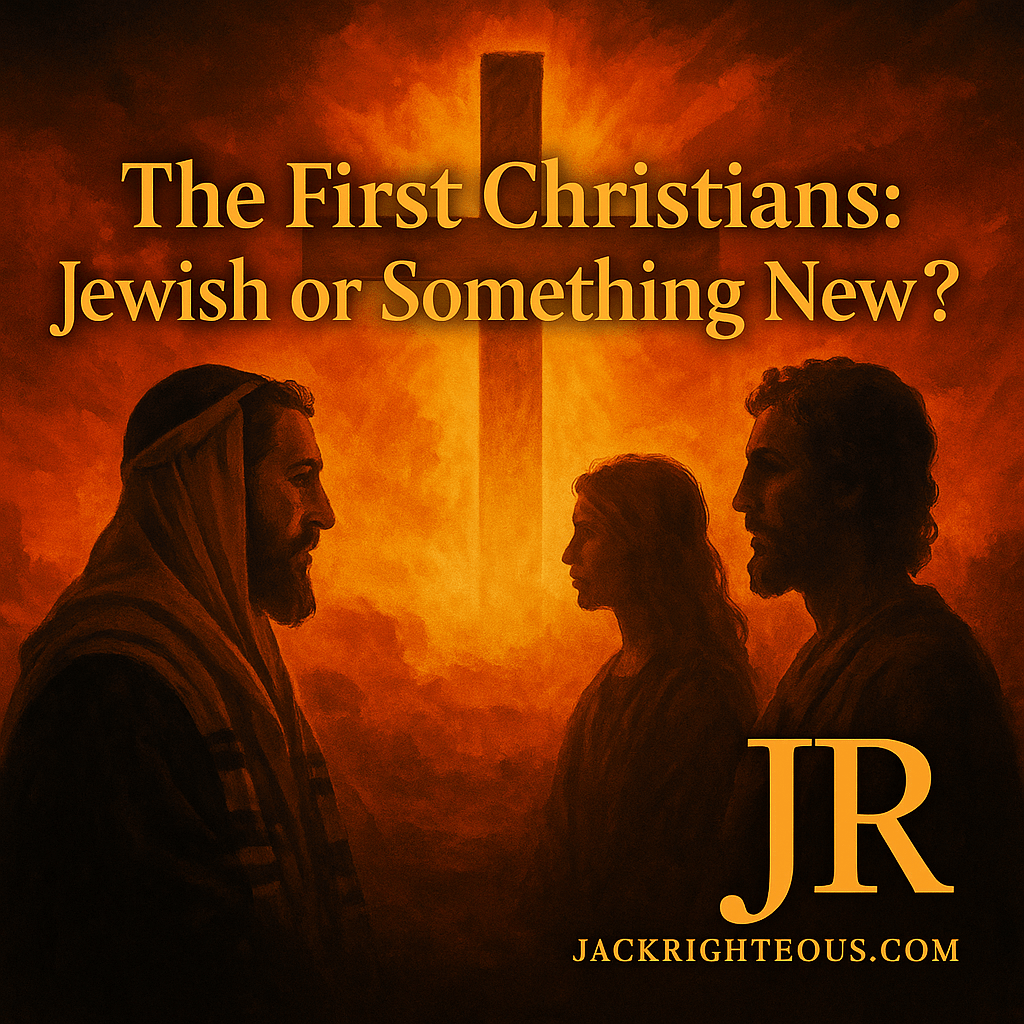
The First Christians: Jewish or Something New?
Gary WhittakerThe First Christians: Jewish or Something New?
🗓️ Updated: July 2nd, 2025
Introduction: Did Jesus’ Followers Start a New Religion?
When Jesus walked the earth, his followers were all Jewish. They worshiped in synagogues, followed Torah, and celebrated Jewish feasts.
Yet, by the time Christianity spread across the Roman Empire, it had become a separate faith. How did that happen?
This article explores:
✔ Who were the Nazarenes and Ebionites?
✔ Did the first Christians keep Torah?
✔ What caused Christianity to split from Judaism?
✝️ This is part of the Profiles in Righteousness historical-faith series — designed for truth-seekers, musicians, and creators asking: What did Jesus actually start?
🎧 While you read, explore our Suno-powered sound library for biblical storytelling inspiration:
Start your Suno AI journey here »
1. The First Christians Were Jewish
Jesus' earliest followers—including Peter, James, and John—did not think they were starting a “new religion.” They believed:
✅ Jesus was the Messiah promised in the Hebrew Scriptures
✅ The Torah and Jewish customs were still valid
✅ Gentiles (non-Jews) could join—but how? That sparked debate.
A. The “Nazarenes” – The First Jewish Christians
- Acts 24:5 calls Paul a leader of “the sect of the Nazarenes”
- These early believers accepted Jesus as Messiah but continued keeping Jewish law and customs
B. The Church in Jerusalem – Led by James, Jesus’ Brother
- Acts 21:20: “You see, brother, how many thousands of Jews have believed, and they are all zealous for the Torah.”
- They still prayed at the Temple (Acts 2:46, Acts 3:1)
✅ The early church wasn’t abandoning Judaism — it saw Jesus as fulfilling it.
2. Did Early Christians Still Follow Torah?
Yes. The first followers of Jesus continued to observe Jewish traditions.
✔ Sabbath (Shabbat) – Worshiped in synagogues on Saturday (Acts 13:14, 17:2)
✔ Kosher Laws – Peter had never eaten non-kosher food (Acts 10)
✔ Temple Worship – They prayed daily at the Temple (Acts 3:1, 5:42)
✔ Circumcision & Identity – Timothy was circumcised (Acts 16:3)
But something was about to change...
3. The First Great Debate: Should Gentiles Follow Jewish Law?
As Gentiles embraced Jesus, a pressing question emerged:
💬 Do Gentile believers need to follow Jewish law?
A. Paul vs. the Jerusalem Council (Acts 15)
- Some Jewish Christians insisted Gentiles must be circumcised
- Paul & Barnabas disagreed: faith in Jesus was enough
The decision:
- Gentiles don’t need circumcision (Acts 15:19-20)
- They must avoid idolatry, sexual immorality, and blood
✅ Jewish Christians kept Torah
✅ Gentile believers were welcomed without full conversion
This became the first major fracture in the Jesus movement.
4. The Ebionites: The Other Jewish Christian Group
Not everyone agreed with Paul. A group called the Ebionites taught:
✅ Jesus was Messiah, but not divine
✅ Torah observance was still required
✅ Paul was wrong in abandoning the law
💡 The Ebionites remind us: early Christianity wasn’t monolithic—it was a battleground of competing visions.
5. How Did Christianity Separate from Judaism?
The full break didn’t happen overnight. But key moments led to it.
A. The Roman Destruction of the Temple (70 CE)
- Judaism restructured around rabbis and synagogues
- Christianity spread beyond Jewish communities, increasingly led by Gentiles
B. The Jewish Revolts (66–135 CE)
- Jewish Christians didn’t join the fight against Rome
- They were branded as traitors by both sides
C. The Rise of Gentile Christianity
- Gentiles outnumbered Jewish believers
- Sabbath became Sunday
- Jewish customs were increasingly abandoned
6. The Final Break: The Council of Nicaea (325 CE)
Under Emperor Constantine:
- Christianity was formalized as the Roman religion
- Easter replaced Passover
- Jewish roots were stripped out of Christian tradition
By the 4th century, Christianity had become something new—and something quite different from the Jewish Jesus movement it began as.
Conclusion: The First Christians Were Jewish — But History Changed the Path
✅ Jesus’ followers were Torah-keeping Jews
✅ Gentile inclusion sparked the earliest doctrinal debate
✅ Jewish-Christian sects like the Ebionites persisted, but were marginalized
✅ The destruction of the Temple and the rise of Rome shifted Christianity into new territory
✅ The Council of Nicaea finalized the break
📖 Next in the Series:
The Early Church & the Formation of Christian Doctrine
In the next article, we’ll ask:
🔹 How was Jesus officially declared divine?
🔹 When did the New Testament take shape?
🔹 How did Catholicism emerge—and what was left behind?
🔍 Explore the Full Series:
Profiles in Righteousness: Understanding Jesus, His Followers, and the Faith That Formed
🔹 Jesus in History: What We Know for Certain
🔹 Jesus as a Jewish Rabbi: Torah and Law
🔹 The First Christians: Jewish or Something New?
🔹 The Early Church & Christian Doctrine
🔹 Christianity Divided: Catholic, Orthodox, Protestant
🔹 Trump’s Evangelicals vs. Biblical Christianity
🔹 Where Does Christianity Go From Here?
💥 Start Your Own Faith-Aligned Creator Journey
Ready to Launch or Level Up Your AI Music Journey?
🔹 Start Here – The Suno AI Creator Guide:
https://jackrighteous.com/pages/suno-guide-getting-started
🔹 Learn to Brand with Sound – GET JACKED Into Suno Branding:
https://jackrighteous.com/pages/start-ai-music-branding
🔹 Unlock the Full Anthem Path – GET RIGHTEOUS System Access:
https://jackrighteous.com/pages/get-righteous-anthem-guide
(Requires one of the following:
– https://jackrighteous.com/products/get-jacked-full-pro-kit
– https://jackrighteous.com/products/get-jacked-pro-ai-music-kit
– https://jackrighteous.com/products/sanctuary-digital-download-support-the-album-build)
🎧 Join our Suno AI music community and claim 250 free credits:
https://suno.com/invite/@jackrighteousmusic

